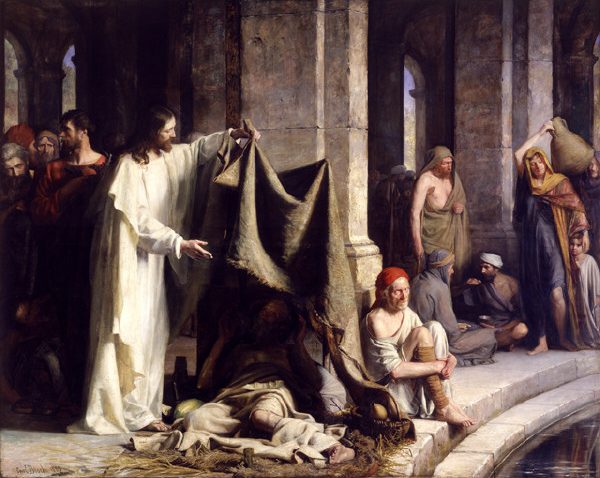***
***
Supernatural healings are rare events. I believe in miracles. My wife and I both believe that God has directly healed us of some things. I pray for them. I also believe that God has the final say as to whether they occur, not us. In the meantime, God has given medical professionals the wisdom to effect natural cures in many if not most cases. The end result is the same: whether it comes about through natural or supernatural means.
We all die at some point. Whenever someone dies, then that is an instance where they were not healed. It’s not always God’s will to heal. Paul had a thorn in the flesh (many Bible scholars believe it was an eye disease). He asked God to take it away. God said no. I think we’d all agree that Paul had tremendous faith. It didn’t matter. God said no to his request because it wasn’t His will. He said His grace was sufficient, minus the healing.
There are many other similar examples. The physical suffering of the saints alone massively demonstrates this. Job was the most righteous man on the earth. He went through tremendous physical and emotional suffering, and God didn’t take that away, despite his righteousness.
I just want to make clear what the biblical and Catholic position on healing is. We are to pray for it. Miracles are always rare and extraordinary by definition. Sometimes God will say no, because He knows all things, and His plans for our lives don’t usually line up with what we think will or should happen. He uses suffering in His overall purpose as well, which is why we had the passion and crucifixion of our Lord and Savior Jesus Christ, martyrs, and the suffering (and often, early deaths) of virtually all saints all through history.
Lots of folks out there are pushing false teachings about healing (and “prosperity”) and it has caused great suffering and disenchantment for many thousands when they discover that the false teachings do not work in real life.
We mustn’t reject miracles and healing (we are to pray for them) or, on the other hand, think they are ours to command. A happy medium or golden mean, exists, as in most matters in Christianity.
The next life is the key to the whole thing, which is why Paul said the sufferings of the present time can’t be compared to what awaits us. But he doesn’t deny that we suffer here, which is the thing to note there. God does answer all our prayers: with a yes or a no (as in Paul’s case).
Obviously, if we ask something clearly against His will (such as a person to be murdered or some terrible thing), He won’t answer. It has to be in His will. I’m saying that it is not always His will to heal, and I’ll be happy to back that up with many biblical examples.
God’s sovereignty goes far beyond our “positivity” and “negativity” (which is not biblical terminology but that of pop psychology). The primary factor in any miracle is God’s will and what He wants to accomplish, not our lack of faith or “positivity.” That places man far too high in the scheme of things.
Jesus raised Lazarus not because his sister was “positive” and giddy with faith (she was upset, and Jesus Himself wept: John 11:33-35), but because it was His will.
* * *
Faith is not unrelated to healing, but neither is not the direct one-on-one relationship: as if it is some kind of magical power that we have. Not so! We can or may have all the faith in the world (as Paul did with his “thorn”) but if it it isn’t God’s will to heal in the particular case, He won’t, because He’s in control, not us and can see the whole picture (being omniscient and sovereign) in a way that we never could. St. Paul couldn’t get healed in his case, and couldn’t heal others (Trophimus) when it wasn’t God’s will.
As for this business about someone having faith as a “stand-in”, okay, let’s test that. Someone says they have a lot of faith? Cool! Why don’t they spend all day, then, going to hospitals and clearing all the floors of sick people with their extraordinary faith? If a stand-in is all we need, then there should be no hospital in the world with sick people in it. For certainly, we can find some saintly person somewhere who has the faith to heal all of them, if this indeed were true. If I had that power I’d spend all of my time visiting hospital after hospital.
But it’s not true. It’s a distortion of biblical and Catholic teaching: not taught anywhere in the magisterial documents. The Church believes in miracles and healings, and we can and should pray for them (I did myself in this thread): just not in this manner that the “hyper-faith” / “name-it-claim-it” outlook does. That is an extreme view: influenced by occultic and New Age notions that come from outside of Christianity, as many books on the topic have documented.
I defend, by the way, the Catholic charismatic movement on my blog, in three papers, so no one can make the accusation that I believe this way because I am “anti-charismatic.” I am pro-Catholic and pro-Bible, and neither teaches the distorted notions of healing described.
I was told that Jesus didn’t do any miracles in his hometown, Nazareth, because of the general lack of faith.
Matthew 13:58 (RSV) And he did not do many mighty works there, because of their unbelief.
It was not no miracles, but rather, not “many.” When people didn’t have faith, Jesus didn’t do miracles to “dazzle them” and make them believe. That wasn’t what He was about.
It doesn’t follow, however (either logically or in practice), that miracles are inevitably or always brought about just because a human being can muster up enough faith and “positivity.” That is a pernicious error, and those who have believed it have often been brought to despair because of their false expectations from a false teaching.
Faith is an important consideration in miracles, but it is also true that there is not an absolute equation of more faith = more miracles, or faith required in each and every case. If someone is so convinced that the hyper-faith conception of healing and ministries is correct, they ought to produce magisterial documents to back it up. They can’t find anything in official Catholic documents that would teach that God always heals, or that He will always heal provided only that someone has enough faith for Him to do so, or that faith alone automatically brings it about as if by magic or rote. Show us these documents! I follow the teachings of Holy Mother Church, and will be happily corrected by her if anyone shows me documents that prove I am wrong in what I am asserting.
It was stated that Jesus healed everyone who came to Him in faith and asked for healing. That may indeed be the case (I believe it is), yet after He ascended to heaven it has not remained true that all who go to God and ask for healing are healed. Jesus is God, and God turned Paul down when he wanted to be healed. Why couldn’t Paul be healed? Why couldn’t he always heal others? Is his example not relevant to us today?
Even if it were true that Jesus healed everyone within His eyesight or those who specifically came up to Him, it wouldn’t follow that this is an ironclad principle for all-time: that God now heals all who come to Him in faith. Paul’s example alone is enough to disprove that. Trophimus apparently sought him out for healing, but Paul couldn’t do it. Paul recommended to Timothy, wine for his stomach, rather than healing the stomach. Yet in another place Paul’s handkerchiefs healed people.
From the entire biblical data, then, we conclude that God desires to heal some, even many, but not all, and we can make no rule by which God will “always” heal based on someone’s faith or anything else. That’s the gist of what I’m saying. It’s the extreme that I oppose, not healing itself, which I have always accepted, and have experienced myself (so has my wife).
St. Paul:
2 Corinthians 12:7-9 (RSV) And to keep me from being too elated by the abundance of revelations, a thorn was given me in the flesh, a messenger of Satan, to harass me, to keep me from being too elated. [8] Three times I besought the Lord about this, that it should leave me; [9] but he said to me, “My grace is sufficient for you, for my power is made perfect in weakness.” I will all the more gladly boast of my weaknesses, that the power of Christ may rest upon me.
Paul also refers to his bodily illness:
Galatians 4:13-14 you know it was because of a bodily ailment that I preached the gospel to you at first; [14] and though my condition was a trial to you, you did not scorn or despise me, but received me as an angel of God, as Christ Jesus.
The Catechism of the Catholic Church teaches exactly as I did above, using the same example of Paul’s thorn:
1508 The Holy Spirit gives to some a special charism of healing so as to make manifest the power of the grace of the risen Lord. But even the most intense prayers do not always obtain the healing of all illnesses. Thus St. Paul must learn from the Lord that “my grace is sufficient for you, for my power is made perfect in weakness,” and that the sufferings to be endured can mean that “in my flesh I complete what is lacking in Christ’s afflictions for the sake of his Body, that is, the Church.”
Paul had a disease. He refers to being chronically ill in another place:
2 Corinthians 1:8-10 (NASB) . . . our affliction which came to us in Asia, that we were burdened excessively, beyond our strength, so that we despaired even of life, indeed, we had the sentence of death within ourselves in order that we should not trust in ourselves, but in God who raises the dead, who delivered us from so great a peril of death.
If it is argued that he was a special case, and had to undergo sufferings we are not intended to experience, that doesn’t work, because he calls us to imitate him, and says he is our model (therefore, we should all pray to suffer as he did with illness, rather than be healed of all of them):
Philippians 3:17 (NASB) Brethren, join in following my example, and observe those who walk according to the pattern you have in us.
2 Thessalonians 3:7, 9 . . . you ought to follow our example . . . [we] offer ourselves as a model for you, that you might follow our example.
1 Corinthians 11:1 Be imitators of me, just as I also am of Christ.
1 Thessalonians 1:6 You also became imitators of us and of the Lord, having received the word with much tribulation with the joy of the Holy Spirit (cf. Hebrews 6:12, James 5:10-11).
Galatians 4:12 I beg of you brethren, become as I am.
And again, Paul teaches that what he went through, we should also, if we truly want to follow Jesus and to be more and more like Him:
2 Corinthians 1:5-7 (RSV) . . . the sufferings of Christ are ours in abundance . . . if we are afflicted, it is for your comfort and salvation . . . patient enduring of the same sufferings which we also suffer . . . as you are sharers of our sufferings, so also you are sharers of our comfort.














